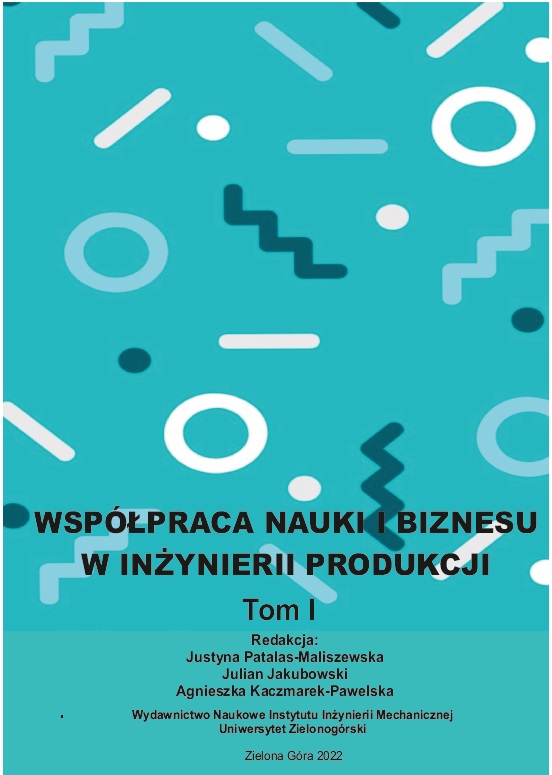Zapisywanie danych...
Streszczenie: Interdyscyplinarny, zorientowany na cyfrową integrację charakter zmian zachodzących w przemyśle pod wpływem nowych technologii, wymaga zarówno z perspektywy kształcenia jak i prowadzenia badań, nowych platform sprzętowych reprezentujących aktualny stan technologii umożliwiających wdrożenie rozwiązań zgodnych z nowym paradygmatem Przemysł 4.0. W artykule zaprezentowano podstawowe założenia, koncepcję i wyposażenie nowoutworzonego Laboratorium Modelowania Inteligentnych Systemów Produkcyjnych będącego częścią Centrum Naukowo-Wdrożeniowego CENWIS Politechniki Świętokrzyskiej.
Abstract: The interdisciplinary, digitally-oriented nature of the changes taking place in an industry under the influence of new technologies requires, both from the perspective of education and research, new hardware platforms representing the current state of technology enabling the implementation of solutions in line with the new paradigm of Industry 4.0. This article presents the basic assumptions, concepts, and equipment of the newly established Laboratory of Intelligent Manufacturing Systems Modelling, which is part of the CENWIS Science and Implementation Centre of the Kielce University of Technology.
B I B L I O G R A F I A[1] Prifti L. i inni. (2017). A Competency Model for “Industrie 4.0” Employees. [red.] Leimeister J.M. i Brenner W. Proceedings der 13. Internationalen Tagung Wirtschaftsinformatik (WI 2017). St. Gallen : brak nazwiska, 2017, strony 46-60.
[2] Plattform-I40.de. (2019). What is Industrie 4.0? Plattform Industrie 4.0. [Online] 2019. [Zacytowano: 15 Grudzień 2019.] https://www.plattform-i40.de/PI40/Navigation/EN/Industrie40/WhatIsIndustrie40/what-is-industrie40.html.
[3] Plattform-I40.de. (2019). 2030 Vision for Industrie 4.0 – Shaping digital ecosystems globally. Plattform Industrie 4.0. [Online] Październik 2019. [Zacytowano: 15 Grudzień 2019.] https://www.plattform-i40.de/PI40/Redaktion/EN/Downloads/Publikation/Vision-2030-for-Industrie-4.0.pdf?__blob=publicationFile&v=8.
[4] Nardello M., Madsen O. i Møller C. (2017). The smart production laboratory: A learning factory for industry 4.0 concepts. CEUR Workshop Proceedings. 2017, Tom 1898.
[5] Madsen O. i Møller C. (2017). The AAU Smart Production Laboratory for Teaching and Research in Emerging Digital Manufacturing Technologies. Procedia Manuf. 2017, Tom 9, strony 106-112.
[6] Abele E. i inn. (2015).. Learning Factories for research, education, and training. Procedia CIRP. Abele, E. i inn.
2015, Tom 32, strony 1 – 6. https://10.1016/j.procir.2015.02.187.
[7] Abele E. i inn. (2017). Learning factories for future oriented research and education in manufacturing. CIRP Annals - Manufacturing Technology. 2017, Tom 66, 2, strony 803-826. https://10.1016/j.cirp.2017.05.005.
[8] CENWIS. (2021). Strona główna - CENWIS. Centrum Naukowo-Wdrożeniowe Politechniki Świętokrzyskiej CENWIS. [Online] 2021. [Zacytowano: 20 grudzień 2021.]
[9] Hermann M., Boriss O. i Pentek T. 2015. Design Principles for Industrie 4.0 Scenarios: A Literature Review. Working Paper No. 01 / 2015. [Online] 2015. https://doi.org/10.13140/RG.2.2.29269.22248.
[10] Lusciński S. (2018). Digital Twinning for Smart Industry. [red.] Knapčíková L. i inni. MMS 2018, 3rd EAI International Conference on Management of Manufacturing Systems. Dubrovnik, Croatia : European Alliance for Innovation, 2018, strony https://doi.org/10.4108/eai.6-11-2018.2279986.
[11] Kazała R. i inni. (2022). An Enabling Open-Source Technology for Development and Prototyping of Production Systems by Applying Digital Twinning. Processes. 2022, Tom 10, 1:21. https://doi.org/10.3390/pr10010021.
[12] Luściński S. (2019). Zarządzanie jakością w ujęciu dynamiki systemów z perspektywy koncepcji Przemysł 4.0. [red.] Borkowski S. i Sawicki A. Wybrane aspekty zarządzania jakością i doskonaleniem. Pelpin : Wydawnictwo Bernardinum, 2019, strony 83-100.
[13] International Standard ISO 22400–1. (2014). Automation systems and integration — Key performance indicators (KPIs) for manufacturing operations management — Part 1: Overview, concepts and terminology. Geneva: International Standard Organization (ISO), 2014.
[14] Luściński S. i Ivanov V. (2020). A Simulation Study of Industry 4.0 Factories Based on the Ontology on Flexibility with Using FlexSim Software. Management and Production Engineering Review. 2020, Tom 11, 3, strony 74-83. https://doi.org/10.24425/mper.2020.134934.
[15] Politechnika Świętokrzyska, Wydział Zarządzania i Modelowania Komputerowego. (2021). Smart Production Labs Network. [Online] 2021. [Zacytowano: 5 Styczeń 2022.] https://smartproduction.tu.kielce.pl. 
